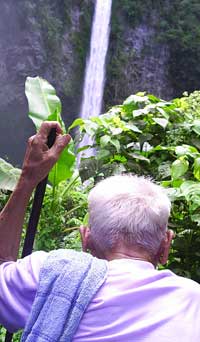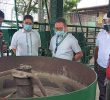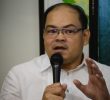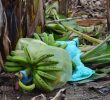A giant power company plans to build a hydroelectric plant in Tudaya, a village in Davao del Sur. Proponents of the project said the plant would “not only offer solution to the power crisis in the offing, but at the same time provide livelihood opportunities and other benefits to the communities.” The Lumads in the area, however, are up in arms, claiming that the plant would desecrate Tudaya Falls, which is their worship ground, and destroy their way of life. They also accuse Hedcor, the power company, of misleading members of the tribe. They expressed their opposition to the project by holding a sacred ritual last week. Davao Today�s Cheryll D. Fiel was there.
STA. CRUZ, Davao del Sur — Apo Adoc Puroc, a 106-year-old revered tribal leader , led his fellow Bagobo-Tagabawas on the path leading to Tudaya Falls, a sacred worship ground known to them as Samboangan, to offer prayers to the spirits in a rare ritual held in what could be the tribe’s most trying of times.
The day was auspicious for Apo Adoc and his fellow tribesmen. If the Aboitiz-owned company Hydro Electric Development Corporation (Hedcor) will succeed in putting up two hydroelectric power plants out of the mountain streams that flow into the Tudaya waterfall, it may have to be their last glimpse of Samboangan.
A sitio of Sta. Cruz town�s barangay Sibulan in Davao del Sur, Tudaya Falls is bounded by Baroring and Sibulan rivers, which Hedcor currently intends to divert and tap for hydroelectric generation to supply the additional power needs of the Davao-based power company Davao Light Power Corporation. But the area is part of the ancestral land of the Bagobo-Tagabawa tribe, a Mindanao indigenous tribe living in the surrounding areas of Mount Apo.
Aside from being the tribe�s sacred worship ground, where they offer prayers and rituals, Mount Apo�s highest waterfall is also where the life of the Bagobo-Tagabawa tribe revolves. Mists coming from the waterfall serve as a natural sprinkler that nourish the surrounding land planted to vegetables, fruit trees, corn, bananas, abaca, sweet potatoes and cassava, as well as coffee even during long hot seasons.
For Apo Adoc, the oldest and deeply revered spiritual leader of the Bagobo-Tagabawa, Tudaya Falls is a gift from God and must never be abused by humans. But Hedcor plans to create weirs across the rivers to control the flow of water and harness it for hydropower. The power firm also plans to build conveyance lines, forebays, penstock and power lines in Sibulan, as well as submerge portions of the land area for manmade headponds, one of which is to be located at the back of Tudaya Elementary School, near Apo Adoc’s village.
Apo Adoc, who also leads the oldest indigenous sect called the �Sandawa Sariling Langis,� known here as �Lanahan,� said he would never ever sign any document that will pave the way for the Hedcor project. He said selling out lands is prohibited by their forebears. He also fears earning the ire of the spirits that dwell in Samboangan.
But he said it is the “outsiders” who are pushing for the project.
* Company fact sheet
* Tudaya investment (here, here and here)
* Thrust for hydroelectric energy (here and here)
Early this year, officials assured the public that the Tudaya plant would be beneficial to the people. “These projects not only offer solution to the power crisis in the offing, but at the same time provide livelihood opportunities and other benefits to the communities,” said Gil Dureza of the Board of Investmens.
Hedcor has secured a Certificate of Free and Prior Informed Consent (FPIC), a government requirement for private companies proposing business projects in designated ancestral domain, but according to the research made by the Technical Working Group Committee (TWGC), a team created by Sta. Cruz town officials to look into the effects of Hedcor�s hydropower project, there are anomalies in the process of securing papers for the approval of the project.
TWGC cited in a report obtained by davaotoday.com that there was no proper and satisfactory consultation conducted, including getting permission from residents of the directly affected areas, as well as adequate explanation on the effects the project on the people in the area.
�Lanahan� pastor Lorito Balido said those that Hedcor consulted were not from Tudaya but from neighboring villages. Those from Tudaya who were able to join and signified their agreement were too few, he said. Some of them, he added, had been deceived into signing a document they did not fully understand.
This contradicted Hedcor�s claim that the company had conducted consultation and education campaigns in the ancestral domain area in Sibulan and that people have been properly informed of the project�s effects on their livelihood. (Cheryll D. Fiel/davaotoday.com)
Indigenous Peoples










